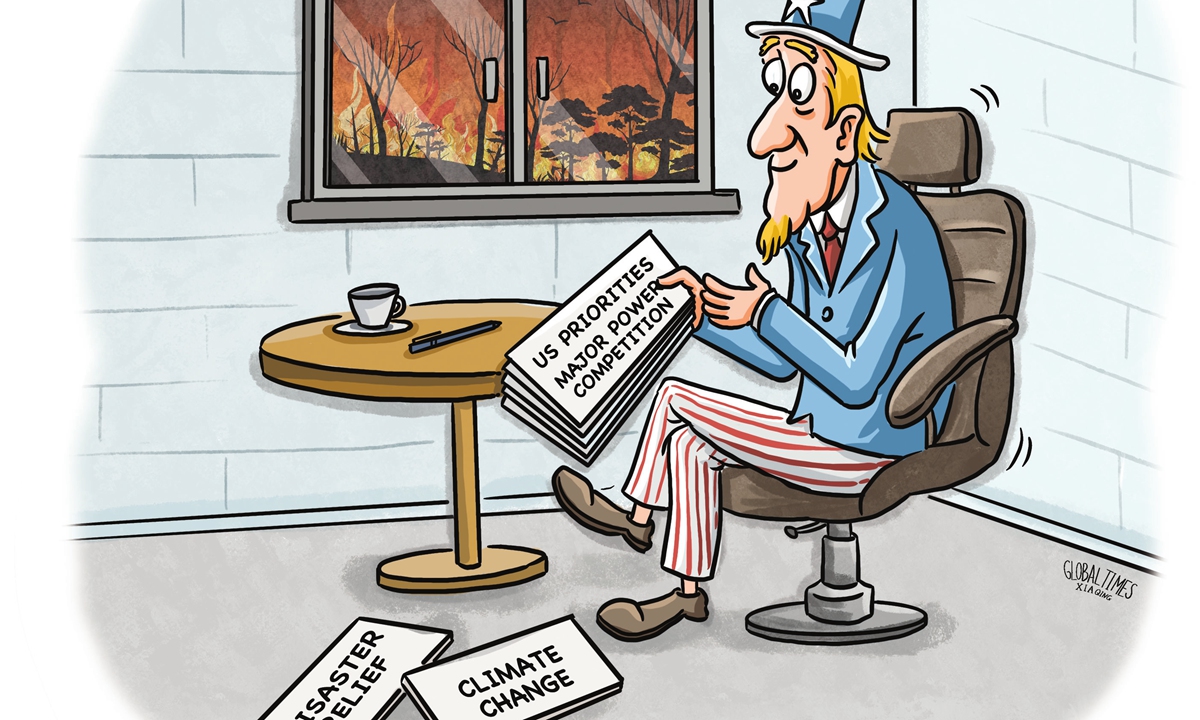
Illustration: Xia Qing/Global Times
Maui, one of the most awe-inspiring places on Earth, has been devastated. Horrible fires - exacerbated by increasing temperatures and drought associated with climate change - have turned this paradise into something resembling a war zone. The pictures do not lie.Fair or not, because climate change showed up in such a brutal way on Maui, a place the rich (and perhaps not so rich) consider one of their playgrounds, the challenge to re-create paradise will be carefully watched. Much like the Notre Dame Cathedral in Paris, damaged by fire more than four years ago, it has to be repaired perfectly - because global audiences are demanding it - Maui will have to be made perfect, or as close to it, because global eyes are watching.
This is the short-term problem: Make Maui great again. And compared to the long-term problem, it will be the easier one to handle. The more vexing, time-consuming and difficult challenge is combating climate change, and there is legitimate worry across the globe that the US is not committed to addressing it.
Unfortunately, President Joe Biden and his administration are not doing enough to be a force for good as burning wildfires and intense heat continue to define the summer of 2023. Yes, his administration has committed $370 billion to clean energy and other climate-supporting projects, which have also spurred job growth. On top of that, one of the more symbolic, but important, steps the White House recently took was sending climate envoy John Kerry to China. There, he examined with Chinese officials a variety of ways the two countries can ensure a safer climate for decades to come.
Yet, Biden has not used his so-called Bully Pulpit, the power that comes with being president and therefore framing the narrative on specific issues, to spur oil companies to do the right thing. A recent New York Times editorial called out big oil for "prioritizing dividends, share buybacks and continued fossil fuel production over increasing their clean energy investments" as this fact "suggests they are unable or unwilling to power the transition forward." Audiences must ask if those words "unable or unwilling" also apply to the president: Why is he not saying forcefully and often that oil companies must champion newer and cleaner energies? If he will not demand more, then who will? And if he will not do it now, then what will the ramifications be in the years to come?
And remember that there are darker clouds on the horizon. On the one hand, results from a recent Pew Research Center poll indicate Americans are aware of the problems associated with climate change and the opportunities the US could take to address it. However, almost one-in-three respondents still wanted the US to continue investing in what can be described in 20th century energy sources such as oil and coal.
Let's take these somewhat sanitary data and summarize them this way: Should Republicans are given the majority in the House of Representatives and Senate in 2024, the US will not be at the epicenter in the fight for a healthier, greener and sustainable planet.
With Republicans running Washington, the aforementioned climate envoy John Kerry will be sent into retirement. The global community, including organizations such as the United Nations, will be laughed at when it calls on the US to engage in meaningful conversations about the climate.
Not possible? It is definitely possible. Forget for a moment whether Donald Trump is the Republican presidential nominee in 2024. Keep in mind that he maintains a vise-like hold on the party; even if someone else is chosen to challenge President Biden in the general election, no Republican who hopes to maintain his or her political power can stray from Trump's beliefs. And one of those beliefs is that climate change is nonsense.
Despite the overwhelming evidence that climate change is real and is causing havoc across the globe and despite America clinging to an outdated idea that it is a place of "exceptionalism," there is no promise that political elites will lead on the issue. Closely related to this, there is no certainty that the public will rally to the cause. If the world's current No.1 economy draws a conclusion that it can remain in that spot by ignoring climate change, then the world can forget about the US being a positive agent in the fight against climate change.
The author is an associate professor at the Department of Communication and Organizational Leadership at Robert Morris University. opinion@globaltimes.com.cn

